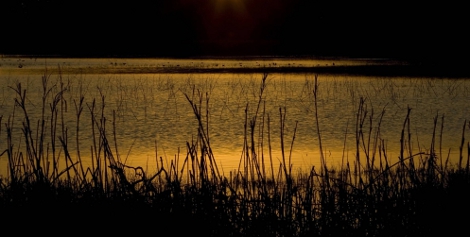
Ontario is proposing measures over the next 15 years to halt the net loss of wetlands, considered among the most biologically diverse and productive habitats on the planet.
"The Ontario government is considering approaches to achieve no net loss of wetlands," says Wetland Conservation in Ontario, a just-released discussion paper.
The paper calls for initial attempts to avoid or minimize wetland loss.
When loss of wetlands can't be avoided or minimized, measures would be required to rehabilitate degraded ecosystems or to restore cleared ecosystems.
And when even those measures are ineffective, developers would be required to provide compensation "for any residual significant, adverse impacts."
“Wetlands are threatened by habitat loss, invasive species, climate change, and pollution," says Minister of Natural Resources and Forestry Bill Mauro. "Together we can find better ways to stop the loss of our wetlands,” Mauro said in a written statement.
Wetlands are defined as places where soil has been sufficiently saturated with water to become waterlogged, permitting water-loving and water-tolerant plants to prosper.
In Southern Ontario, the most common wetlands are swamps, dominated by trees and shrubs.
As one moves north in the province, peatlands become dominant.
Peat is partially decomposed plant material that is often found with Sphagnum moss in the peatlands of Northern Ontario.
Almost 70 percent of Southern Ontario's original wetlands are gone.
Most of the province's surviving wetlands are in Northern Ontario: the Ontario Shield and Hudson Bay Lowlands ecozones have a combined 34 million hectares of wetland, compared to just one million hectares in the Mixedwood Plains ecozone of Southern Ontario.
The province is particularly interested in the unique coastal wetlands found in close proximity to the Great Lakes.
"Coastal wetlands provide recreational opportunities for people and are critcially important to the ecological health of the Great Lakes," the discussion paper says.
Earlier this year, the Ontario Municipal Board cited the need to protect coastal wetlands in ruling against Jeff and Patricia Avery's proposed Pointe Estates subdivision in Sault Ste. Marie's far west end.
"People were told wetlands in Northern Ontario mean something, they're to be protected, so don't start dividing them up and paving them over, because that's not what we're about in Ontario," Peter Gagnon, president of the Pointes Protection Association, told SooToday's Darren Taylor after the OMB decision was released on March 2.
The Ontario government's efforts to protect wetlands started in the mid 1980s, but are currently a dog's breakfast of more than 20 pieces of legislation administered or implemented by five provincial ministries, two federal departments, 444 municipalities and 36 conservation authorities.
Rhonda Bateman, general manager of the Sault Ste. Marie Region Conservation Authority, believes the move toward a consolidated strategic plan is "a really great idea."
"We’ll be looking at it and providing comments," Bateman told SooToday.com.
Lynette Mader, manager of Ontario operations at Ducks Unlimited Canada, is also pleased.
“An overarching plan would provide a clearer path forward for industry and the conservation community," Mader said.
"We look forward to working with the province and others during this review to conserve critical wetland resources and increase the resilience of Ontario communities.”
The province is seeking public input on its move toward a hierarchical approach to achieving its goal of no net loss of wetlands.
The discussion paper can be accessed here.
Your comments may be submitted via the Environmental Registry website
Comments may also be submitted to [email protected] or by completing a survey at www.surveymonkey.com/s/Conserving_Wetlands
The deadline for submissions is October 31, 2015.